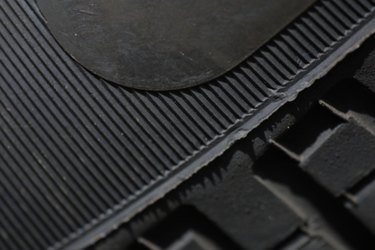Things You'll Need
Plastic or Plexiglas sheet
Lumber
Hot glue
Petroleum jelly
Brush
Gypsum
Mixing bowl

Rubber mats are used in cars, workplaces and homes. They provide an anti-slip surface, and protect carpeting from mud and slush. If you plan to use a lot of these mats, it may be more cost effective to purchase one, then make a mold and cast your own copies out of molding rubber. The process is not complicated, and is referred to as a bucket mold.
Step 1
Place the mat onto a large piece of plastic or Plexiglas. The surface should be at least three inches larger than the mat, on all sides. Secure it in place with hot glue.
Video of the Day
Step 2
Assemble a box of 1-by-4 boards around the mat, leaving one inch of empty space, between the mat and boards, on all sides. Glue the box together with hot glue, as it is a temporary structure.
Step 3
Use hot glue to attach the box to the plastic surface.
Step 4
Seal all the joints, where cement may leak, with hot glue.
Step 5
Allow the glue to cool.
Step 6
Brush the mat, plastic surface, and interior of the box with a thin coat of petroleum jelly.
Step 7
Mix a fine-grain gypsum such as Ultracal 30, or Hydrocal with water, following the instructions on the package. These materials are inexpensive, so make more than you think you will need.
Step 8
Pour the gypsum into the mold, covering the highest point on the mat by one inch.
Step 9
Tap the sides of the mold and the surface of your work table with a rubber mallet. The vibrations will dislodge any trapped air bubbles, causing them to rise to the surface.
Step 10
Allow the gypsum to cure. It will go through an exothermic heating and cooling process. This may take up to two hours.
Step 11
Remove the wood from the gypsum and pull out the rubber mat. You now have a mold of the mat, into which you can pour liquid rubber, to make additional copies.
Video of the Day